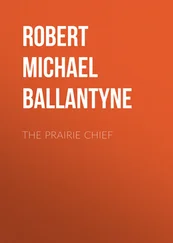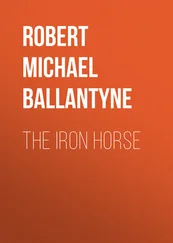Robert Michael Ballantyne - Wrecked but not Ruined
Здесь есть возможность читать онлайн «Robert Michael Ballantyne - Wrecked but not Ruined» — ознакомительный отрывок электронной книги совершенно бесплатно, а после прочтения отрывка купить полную версию. В некоторых случаях можно слушать аудио, скачать через торрент в формате fb2 и присутствует краткое содержание. Жанр: Детские приключения, literature_19, foreign_antique, foreign_prose, foreign_children, на английском языке. Описание произведения, (предисловие) а так же отзывы посетителей доступны на портале библиотеки ЛибКат.
- Название:Wrecked but not Ruined
- Автор:
- Жанр:
- Год:неизвестен
- ISBN:нет данных
- Рейтинг книги:4 / 5. Голосов: 1
-
Избранное:Добавить в избранное
- Отзывы:
-
Ваша оценка:
- 80
- 1
- 2
- 3
- 4
- 5
Wrecked but not Ruined: краткое содержание, описание и аннотация
Предлагаем к чтению аннотацию, описание, краткое содержание или предисловие (зависит от того, что написал сам автор книги «Wrecked but not Ruined»). Если вы не нашли необходимую информацию о книге — напишите в комментариях, мы постараемся отыскать её.
Wrecked but not Ruined — читать онлайн ознакомительный отрывок
Ниже представлен текст книги, разбитый по страницам. Система сохранения места последней прочитанной страницы, позволяет с удобством читать онлайн бесплатно книгу «Wrecked but not Ruined», без необходимости каждый раз заново искать на чём Вы остановились. Поставьте закладку, и сможете в любой момент перейти на страницу, на которой закончили чтение.
Интервал:
Закладка:
R. M. Ballantyne
Wrecked but not Ruined
Chapter One
The Outpost
On the northern shores of the Gulf of Saint Lawrence there stood, not very long ago, a group of wooden houses, which were simple in construction and lowly in aspect. The region around them was a vast uncultivated, uninhabited solitude. The road that led to them was a rude one. It wound round a rugged cliff, under the shelter of which the houses nestled as if for protection from the cold winds and the snowdrifts that took special delight in revelling there.
This group of buildings was, at the time we write of, an outpost of the fur-traders, those hardy pioneers of civilisation, to whom, chiefly, we are indebted for opening up the way into the northern wilderness of America. The outpost was named the Cliff after the bold precipice near the base of which it stood. A slender stockade surrounded it, a flag-staff rose in the centre of it, and a rusty old ship’s carronade reared defiantly at its front gate. In virtue of these warlike appendages the place was sometimes styled “the Fort.”
When first established, the Cliff Fort lay far beyond the outmost bounds of civilised life, but the progress of emigration had sent forward wave after wave into the northern wilderness, and the tide rose at last until its distant murmur began to jar on the ears of the traders in their lonely dwelling; warning them that competition was at hand, and that, if they desired to carry on the trade in peace, they must push still further into the bush, or be hopelessly swallowed up in the advancing tide.
When the unwelcome sounds of advancing civilisation first broke the stillness of this desolate region, the chief of the trading-post was seated at breakfast with his clerk. He was a tall, good-looking, young Englishman, named Reginald Redding. The clerk, Bob Smart, was a sturdy youth, who first saw the light among the mountains of Scotland. Doubtless he had been named Robert when baptised, but his intimates would not have understood you had you mentioned him by that name.
Bob had just helped Reginald to the wing of a salt goose, and was about to treat himself to a leg of the same when the cook entered.
This cook was a man. It may also be said with truth that he was more than most men. At the outpost men were few, and of women there were none. It may be imagined, then, that the cook’s occupations and duties were numerous. François Le Rue, besides being cook to the establishment, was waiter, chambermaid, firewood-chopper, butcher, baker, drawer-of-water, trader, fur-packer, and interpreter. These offices he held professionally. When “ off duty ,” and luxuriating in tobacco and relaxation, he occupied himself as an amateur shoemaker, tailor, musician, and stick-whittler, to the no small advantage of himself and his fellow-outcasts, of whom there were five or six, besides the principals already mentioned.
Le Rue’s face bore an expression of dissatisfaction and perplexity as he entered the hall.
“Oh, Monsieur Redding,” he exclaimed, “dem squatters, de black scoundrils what is be called Macklodds has bin come at last.”
“Ho, ho! the McLeods have come, have they?” said Redding, laying down his knife and fork, and looking earnestly at the man; “I had heard of their intention.”
“Oui, yis, vraiment,” said Le Rue, with vehemence, “dey has come to Jenkins Creek more dan tree veeks pass. Von sauvage come an’ tell me he have see dem. Got put up von hut, an’ have begin de saw-mill.”
“Well, well, François,” returned Redding, with a somewhat doubtful smile, as he resumed his knife and fork, “bring some more hot water, and keep your mind easy. The McLeods can’t do us much harm. Their saw-mill will work for many a day before it makes much impression on the forests hereabouts. There is room for us all.”
“Forests!” exclaimed the cook, with a frown and a shrug of his shoulders, “non, dey not hurt moche timber, but dey vill trade vid de Injins—de sauvages—an’ give dem drink, an’ git all de furs, an’ fat den vill come of dat?”
Without waiting for a reply the indignant cook went in quest of hot water, leaving the traders to discuss the salt goose and the news.
“That’s bad news,” said Bob Smart. “What do you propose to do in the circumstances?”
“Something definite must be done,” replied Redding, “but I don’t yet see my way as to what.”
Having finished the goose between them, and turned its skeleton over with an inquisitive glance to make sure that nothing eatable had escaped, the two friends finished their frugal meal with a cup of tea and a fried cake of the simplest elements—flour and water—after which they drew their chairs to the fireplace,—a large open chimney well filled with blazing logs,—lighted their pipes, and entered on a discussion of the McLeods and their present position.
When their pipes were emptied, Redding arose, and, turning his back to the fire, said:—
“Well, Bob Smart, this is the outcome of our cogitations. I am almost certain that these McLeods have taken up their quarters within the boundary of our Company’s reserve lands, and if so, they must be routed out of their nest at once. Delay in such matters is often fatal. The law of use and wont, Bob, is soon established; but I have a strong objection to act in uncertainty. I will therefore drive up to the hut of Jonas Bellew, with whom I shall leave horse and sleigh, as the track ends at Boulder Creek, and proceed on snow-shoes to the new settlement in Partridge Bay, where the surveyor lives, who has the plans of our reserve lands. I shall examine these plans, and if I find that our property has been invaded, then—”
“Death and confusion to the McLeods,” interrupted Bob. “Well, perhaps that is the best thing to do; but the spring is well advanced. The thermometer stood high this morning. If a thaw should set in, you will find the walking in snow-shoes bad.”
“‘If’ is a word to which you attach too much importance, Bob. We have not at present to do with what may be, but with what is.”
“True, nevertheless a prudent man has regard to probabilities,” replied Bob, with an air of much wisdom, as he relighted his pipe.
“Just so,” returned Redding, “and as there is every probability that I shall be absent a good many days, I leave you in charge of this establishment, with strict injunctions to keep aloof from the McLeods, and at the same time to keep an eye on them. François Le Rue will accompany me. I shall start immediately, therefore be pleased to go and tell Le Rue to get himself and the sleigh ready while I put on my travelling gear.”
Obedient to the order, Smart left the room while his superior clothed himself in a leathern coat and leggings, fur cap, moccasins, and mittens.
In half an hour Redding and his man stepped into a sleigh, which was barely large enough to hold them. They packed themselves up to the armpits in bearskin rugs, and then Redding gave his rough little nag a touch of the whip, which caused him to start forward with a jerk that set all the bells on his harness ringing merrily. Another minute and they dashed out at the gate, swept round the base of the beetling cliff that frowned above the outpost, and entered the sombre shadow of the forest.
Chapter Two
The Recluse of Boulder Creek
The road along which the travellers proceeded was desolate and dreary in the extreme.
Already darkened by clouds and snow-drift, it was rendered still more gloomy by overhanging and snow-laden branches of stunted pines. It was just broad enough to permit the passage of a single vehicle, being a mere woodman’s track, which had been extended beyond the ordinary limits of such tracks, for his personal convenience, by Jonas Bellew, a trapper who dwelt at that part of the coast already mentioned as Boulder Creek. The track followed the windings of a streamlet which was at that time covered with snow, and only distinguishable by the absence of bushes along its course. It turned now to the right, now to the left, as rocks, or mounds, or cliffs presented obstacles. In some places it dived precipitately into a hollow that necessitated careful driving; in others it ran straight up to the brow of a hill at an angle that obliged the travellers not only to get out and walk, but also to aid their panting pony by putting their shoulders to the back of the sleigh. Here and there a level patch occurred over which they trotted briskly, and then down they went again by a steep incline into the bed of an ice-buried stream, to find a similarly steep ascent on the other side. Occasionally, coming to a wall-like cliff surrounded by a tangled and trackless forest, they were forced to seek the shores of the sea, and there, among rocks and ice-drift, pick their way slowly along.
Читать дальшеИнтервал:
Закладка:
Похожие книги на «Wrecked but not Ruined»
Представляем Вашему вниманию похожие книги на «Wrecked but not Ruined» списком для выбора. Мы отобрали схожую по названию и смыслу литературу в надежде предоставить читателям больше вариантов отыскать новые, интересные, ещё непрочитанные произведения.
Обсуждение, отзывы о книге «Wrecked but not Ruined» и просто собственные мнения читателей. Оставьте ваши комментарии, напишите, что Вы думаете о произведении, его смысле или главных героях. Укажите что конкретно понравилось, а что нет, и почему Вы так считаете.












